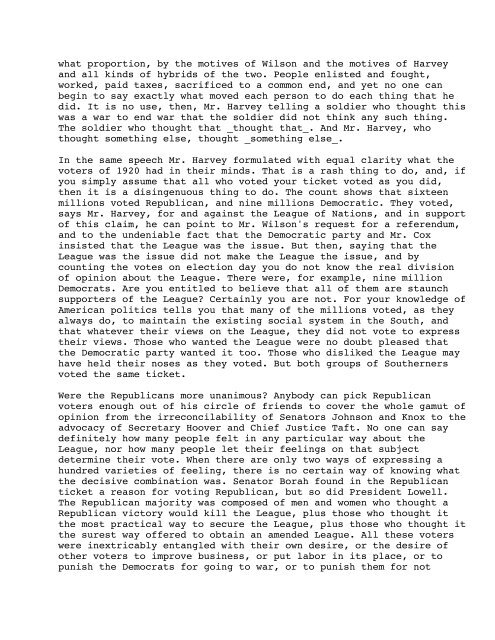PUBLIC OPINION by WALTER LIPPMANN TO FAYE LIPPMANN ...
PUBLIC OPINION by WALTER LIPPMANN TO FAYE LIPPMANN ...
PUBLIC OPINION by WALTER LIPPMANN TO FAYE LIPPMANN ...
Create successful ePaper yourself
Turn your PDF publications into a flip-book with our unique Google optimized e-Paper software.
what proportion, <strong>by</strong> the motives of Wilson and the motives of Harvey<br />
and all kinds of hybrids of the two. People enlisted and fought,<br />
worked, paid taxes, sacrificed to a common end, and yet no one can<br />
begin to say exactly what moved each person to do each thing that he<br />
did. It is no use, then, Mr. Harvey telling a soldier who thought this<br />
was a war to end war that the soldier did not think any such thing.<br />
The soldier who thought that _thought that_. And Mr. Harvey, who<br />
thought something else, thought _something else_.<br />
In the same speech Mr. Harvey formulated with equal clarity what the<br />
voters of 1920 had in their minds. That is a rash thing to do, and, if<br />
you simply assume that all who voted your ticket voted as you did,<br />
then it is a disingenuous thing to do. The count shows that sixteen<br />
millions voted Republican, and nine millions Democratic. They voted,<br />
says Mr. Harvey, for and against the League of Nations, and in support<br />
of this claim, he can point to Mr. Wilson's request for a referendum,<br />
and to the undeniable fact that the Democratic party and Mr. Cox<br />
insisted that the League was the issue. But then, saying that the<br />
League was the issue did not make the League the issue, and <strong>by</strong><br />
counting the votes on election day you do not know the real division<br />
of opinion about the League. There were, for example, nine million<br />
Democrats. Are you entitled to believe that all of them are staunch<br />
supporters of the League? Certainly you are not. For your knowledge of<br />
American politics tells you that many of the millions voted, as they<br />
always do, to maintain the existing social system in the South, and<br />
that whatever their views on the League, they did not vote to express<br />
their views. Those who wanted the League were no doubt pleased that<br />
the Democratic party wanted it too. Those who disliked the League may<br />
have held their noses as they voted. But both groups of Southerners<br />
voted the same ticket.<br />
Were the Republicans more unanimous? Anybody can pick Republican<br />
voters enough out of his circle of friends to cover the whole gamut of<br />
opinion from the irreconcilability of Senators Johnson and Knox to the<br />
advocacy of Secretary Hoover and Chief Justice Taft. No one can say<br />
definitely how many people felt in any particular way about the<br />
League, nor how many people let their feelings on that subject<br />
determine their vote. When there are only two ways of expressing a<br />
hundred varieties of feeling, there is no certain way of knowing what<br />
the decisive combination was. Senator Borah found in the Republican<br />
ticket a reason for voting Republican, but so did President Lowell.<br />
The Republican majority was composed of men and women who thought a<br />
Republican victory would kill the League, plus those who thought it<br />
the most practical way to secure the League, plus those who thought it<br />
the surest way offered to obtain an amended League. All these voters<br />
were inextricably entangled with their own desire, or the desire of<br />
other voters to improve business, or put labor in its place, or to<br />
punish the Democrats for going to war, or to punish them for not





